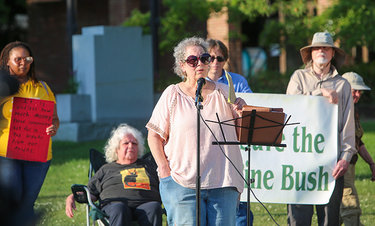Draft of comprehensive plan update should be public, expert says
GUILDERLAND — During the May 14 meeting of the Guilderland Comprehensive Plan Update Committee, resident Robyn Gray wanted to know why a copy of the preliminary draft plan hadn’t been made available to the public.
Since the fall of 2022, a committee of residents has been working with a consultant to update Guilderland’s comprehensive plan; the first draft of that plan was discussed by the committee on May 14.
During public comment, Gray said town attorney James Melita had previously written a memo stating that “this committee would be following the Open Meetings Law.”
Yet when she went online that day to look for the preliminary draft, “I said, ‘OK, where's the comprehensive plan? Where's the draft? It's not up there.’ If you are putting [the draft plan] in, you are following the Open Meetings Law, pursuant to what Mr. Melita said, [then] that document needs to be published and should have been published online, at least 24 hours before this meeting.”
Gray said, “If it’s a draft, you say it’s a draft. But that document, the public is entitled to look at pursuant to the Open Meetings Law — so why wasn’t it posted?”
Gray heads the Guilderland Coalition for Responsible Growth and is also a member of the Coalition for Open Government’s Capital Region advisory council.
Gray, according to Melita, was correct in stating that the committee should be complying with the Open Meetings Law. But the document, Melita told The Enterprise by email on Monday, does not have to be disclosed.
In a May 2023 memo to the update committee Melita wrote that it’s “an advisory board and does not perform a governmental function, it is not governed by the OML.” However, he did recommend the group “comply with the OML’s requirements to the maximum extent possible.”
But Melita went further this week, stating by email that the town has considered the committee “subject to Open Meetings Law” since its inception.
As for making the preliminary draft plan available to the public, Melita said it was not required because the state’s Public Officers Law “Section 87(2)(g) in relevant part states an … ‘agency may deny access to records or portions thereof that…(g) are inter-agency or intra-agency materials which are not final agency policy or determinations.’ The draft plan is an inter-agency document and is not subject to disclosure ….”
He went on to say, “There will be plenty of opportunity for the public to comment and weigh in regarding the draft and final plans ….”
But Kristin O’Neill, the assistant director of the Committee on Open Government, says Melita’s argument doesn’t hold water, and that’s due in part to the update committee no longer being subject to Open Meetings Law only in the eyes of the town, but subject to New York’s sunshine law in the eyes of the state, because it now meets the statute’s definitional criteria.
Melita in his 2023 memo stating why the update committee wasn’t subject to the Open Meetings Law, wrote that New York State Town Law “outlines how to develop and adopt a new or updated plan. One way to update the plan is by appointing a ‘special board.’ This board includes one or more planning board members and other members chosen by the town board to prepare a proposed plan or an amendment. Since the CPUC does not have a planning board member, it is not a ‘special board’ and is not ‘performing a governmental function.’”
At the time Melita wrote his opinion, according to O’Neill, he was correct: The update committee was not a special board, and that’s because Dominic Rigosu was a member of the update committee but not a member of the planning board, which is no longer the case. Rigosu was named to the planning board in January, approximately six months after Melita offered his opinion to the update committee.
While Rigosu’s addition to the planning board solidified the update committee as a special board subject to state law, “the Town has treated the Update Committee as a ‘special board,’ subject to Open Meetings Law, since the inception of the Update Committee as a board. It makes no difference who the particular members of the Update Committee are,” according to Melita.
With the preliminary draft of the update plan, O’Neill said the committee waived its ability to use the inter-agency or intra-agency argument by discussing the draft during an open meeting,
She then pointed to the statute illustrating her point, section 103E of the Public Officers Law, which says in part that “agency records available [under the Freedom of Information Law] as well as any proposed resolution, law, rule, regulation, policy or any amendment thereto, that is scheduled to be the subject of discussion by a public body during an open meeting shall be made available, upon request therefor, to the extent practicable at least twenty-four hours prior to the meeting during which the records will be discussed.”
“(e) Agency records available to the public pursuant to article six of this chapter, as well as any proposed resolution, law, rule, regulation, policy or any amendment thereto, that is scheduled to be the subject of discussion by a public body during an open meeting shall be made available, upon request therefor, to the extent practicable as determined by the agency or the department, prior to or at the meeting during which the records will be discussed. Copies of such records may be made available for a reasonable fee, determined in the same manner as provided therefor in article six of this chapter. If the agency in which a public body functions maintains a regularly and routinely updated website and utilizes a high speed internet connection, such records shall be posted on the website to the extent practicable as determined by the agency or the department, prior to the meeting. An agency may, but shall not be required to, expend additional moneys to implement the provisions of this subdivision.
“So here it’s like a policy. It’s the town comprehensive plan,” O’Neill said.
The draft plan falls under the portion of the statute that states, “as well as any proposed resolution, law, rule regulation or policy,” O’Neill said, and should have been made available to the public.
O’Neill said the entire point of the provision is to allow the public to follow along with the public body as it discusses the document.
And if the argument is made that the preliminary draft plan is not considered a proposed resolution, law, rule, regulation, or policy, O’Neill expanding on her earlier point, said, “It’s still an agency record that would be available under FOIL because they’re discussing the content of it during an open meeting and by discussing the content of it during an open meeting, they’re really sort of waiving their ability to characterize it as [intra-agency or inter-agency] sort of goes out the window.”



